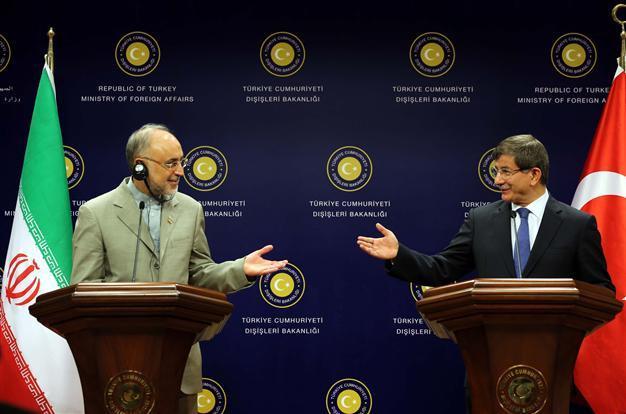Turkish, Iranian foreign ministers call for cease-fire in Syria during Ramadan
ANKARA

Both foreign minister met today in Ankara for the first time since moderate cleric Hassan Rouhani was elected president last month. AA photo
Turkish Foreign Minister Ahmet Davutoğlu and his Iranian counterpart, Ali Akbar Salehi, have called on the parties fighting in Syria to enact an immediate cease-fire for Ramadan during a joint press conference in Ankara on July 12.“The massacre has to cease. It is impossible to see as legitimate the bombing of civilians, even more during Ramadan. We are calling for a cease-fire to let our Syrian brothers realize Ramadan,” Davutoğlu said.
Salehi also joined the call, noting that a similar appeal had been made last year but proved unsuccessful. “During Ramadan, Muslim countries have to be closer to each other. Unfortunately, we are witnessing in some Muslim countries that the blood of civilians is still being spilled,” Salehi said, expressing his hopes that a temporary cease-fire in Ramadan would prove itself permanent.
“Ramadan is a good pretext for the cease-fire. We are officially calling on both parties. We hope that it becomes a start for a solution,” he said.
Davutoğlu also urged all “foreigners” fighting in Syria to immediately leave the country. "The same has to be said for Hezbollah, which entered Qusayr and other Syrian towns in the past three months," he added in reference to the Lebanese Shiite militia group.
Both foreign ministers also said the Egyptian military takeover had been on the top of their agenda during the talks. While Davutoğlu repeated his call to the new rulers to “respect the Egyptian people’s will,” Salehi said Iran was hoping that control would not be lost. “[The only people] who can determine Egypt’s future are the Egyptian people,” Salehi said.
Although stressing that it was not the main topic during the meeting, Davutoğlu and Salehi also said the bilateral relations were very healthy.
“The relations are unique in the world as we have a lot of common points,” Salehi said.
The meeting is the first since moderate cleric Hassan Rouhani was elected president last month.
The visit came as Ankara stated that it saw Rouhani's election positively and said it hoped for changes in Iran's policy toward Syria with the new presidency. The countries have adopted diametrically opposed stances vis-à-vis Syria; Tehran continues to be the closest ally of the Bashar al-Assad government while Turkey openly supports the opposition.
















